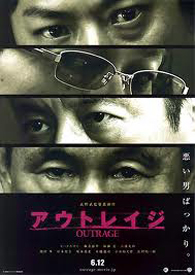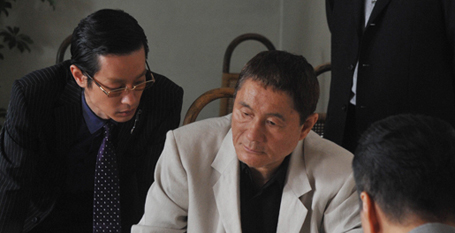
Outrage then is Kitano’s last word on the genre. Gone is the bleak world of hardened gangsters paying debts of gratitude and honour to their brothers and superiors, and the tragic cycle of inevitable violence and bloodshed. That was a dramatic world invented by Kinji Fukusaku a generation ago and repopularised by Kitano, but all that is bunk now. The gangsters in the world of Outrage are greedy and grasping conmen without trust and honour, dealing more in betrayal, deceit, and backstabbing. The joke here is that the gangsters still maintain a façade of yakuza respectability and honour while plotting to the demise of their rivals – who are of course their closest friends and benefactors.
Takeshi Kitano plays a fortunate pawn in this grand game of yakuza chess where there are no rules. When Outrage begins, his assignment as a head of a smallish clan is to provoke an all out war between two larger yakuza organisations (a set-up similar to Yojimbo) – yet manage the chaos so that operations will continue to be profitable when the eventual victors take over the rackets in the area.
Comedy and violence are mainstays in Kitano productions, but this one turns the familiar equation on its head. Here, the orgiastic violence is deadly serious and very painful to watch, while the plot itself that is all-out funny. Takeshi Kitano has no pity for his stock yakuza characters and their foibles. How everyone’s buttons are pressed just in the right manner and at the right time in Takeshi Kitanos’s operation to start a full-scale war can make for dark humour indeed. Simply put, Outrage is an outrageous comedy of yakuza manners.
Outrage is a welcome return to form for Takeshi Kitano after his self-referential arthouse phase.












 列印版本
列印版本









